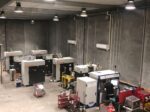How RAM3D became the largest independent metal AM service in Australasia
New Zealand company operates seven metal AM systems Though it may best be known for the Kiwi bird, Lord of the Rings and its inspirational Prime Minister, New Zealand has another claim to fame in the additive world: it is home to the largest independent metal 3D printing service in the Southern Hemisphere: RAM3D. Founded in 2008, the Tauranga-based company has had an interesting journey over the past decade, partaking in metal AM’s transition from a one-off custom prototyping solution to an industrial production process. This journey in itself is interesting, as RAM3D played a vital role in the evangelisation of metal 3D printing in its part of the world—a role that many service providers have played. In short, 3D printing metal parts for customers was only part of its job in its earlier years, it also had to focus on raising awareness of AM, educating on DfAM and facilitating the shift from prototyping to production. “In our very early days the perception of 3D metal printing really was that it was just for one-off, custom part prototyping,” explained Gilly Hawker, RAM3D Marketing Manager. “Its real benefits, in terms of improved part functionality, part integration, weight reduction, cost effectiveness and so on, just weren’t widely recognized. We did have to play our part in improving general market awareness and helping to rectify any misconceptions.” One of the big milestones in the company’s evolution has been its partnership with Renishaw, which began in 2014, when the UK-based metal AM company supplied its newest system to RAM3D. At the time, the machine provided the flexibility and openness that RAM3D was looking for, as it had the skills to optimize the AM process for its customers’ applications. “We had lots of ideas of our own on optimising our manufacturing process, and this machine gave us the freedom […]










